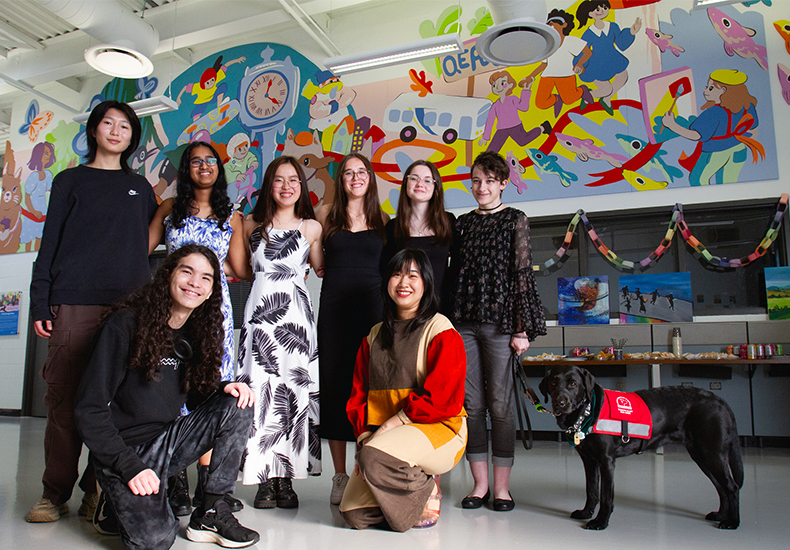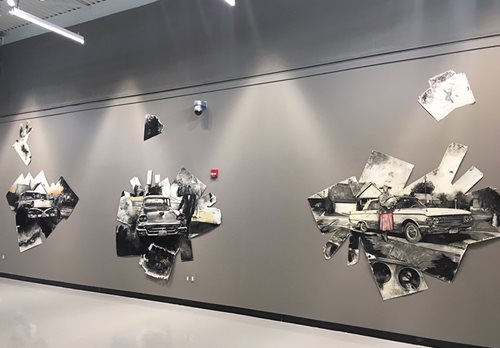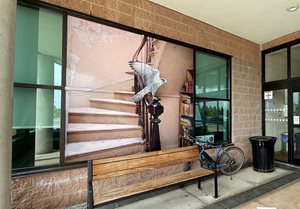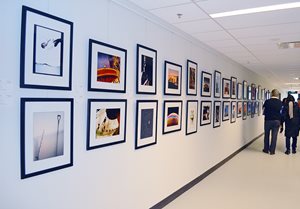Celebrating public art
We celebrate cultural history and creativity through our Public Art Program, Corporate Art Collection, and exhibitions at town facilities as outlined in the Visual Arts Policy. Roles and responsibilities for requesting and/or approving works are defined in the Public Art Procedure.
We maintain a Corporate Art Collection with works on display in many public meeting rooms and facilities.
Our exhibition program showcases creative work of local artists, including work by individuals, art organizations, instructors, and students. Queen Elizabeth Park Community and Cultural Centre (QEPCCC), Glen Abbey Community Centre, Oakville Trafalgar Community Centre and Trafalgar Park Community Centre offer free corridor exhibition space.
The Exhibitions Committee reviews proposals for exhibitions twice a year. Application due dates are February 1 and September 1.
River Oaks Community Centre Youth Mural Project call for young artists

Members from last year's team of youth artists pose with artist Yen Linh Thai and the mural they created at QEPCCC Youth Centre.
Apply by August 2 to be part of this exciting art experience
Oakville Youth Mural Project is inviting up to 12 young artists (ages 13 to 18) to connect, create and collaborate on an indoor public artwork located at River Oaks Community Centre! The final mural will be unveiled during National Youth Week from May 1 to 7, 2025.
Following the huge success of our inaugural team at QEPCCC this past year, a new group of budding young artists will receive hands-on experience in the process of designing and creating public art, guided by the expertise of local professional artist and accomplished muralist Yasaman Mehrsa. Selected youth are required to attend three workshops this fall to develop the design concept and six painting workshops next spring to collaborate on a large-scale mural in one of the community rooms. All workshops are free, and no prior art experience is required. Additionally, participants will gain 40 volunteer hours through their involvement in the project.
New mural coming to Glen Abbey Community Centre

Share your input by August 15!
The Town of Oakville is partnering with STEPS Public Art and artist Julia YH (@_monkyi) to create a new mural along the arena hallway at Glen Abbey Community Centre.
Take the 2024 Glen Abbey public art mural survey to contribute your thoughts and ideas as inspiration for the artwork and help the artist understand the values, stories and history that are important to the Glen Abbey community. Julia hopes to weave these stories into her design to capture the community's essence.
The deadline to complete the survey is August 15, 2024.
Explore local art and artists in Oakville
Watercolours by Yu Zhan
Glen Abbey Community Centre
This series explores Yu Zhan’s experience of immigrating to Canada and becoming fascinated by the beautiful natural scenery here. Hoping that viewers will see some interesting things in their pictures and connect through shared experiences, this is their first art exhibition in Canada since they picked up a paintbrush again. Yu Zhan immigrated to Montréal in 2018 and moved to Toronto in 2021.
The Oakville Camera Club
Oakville Public Library Glen Abbey Branch and Oakville Trafalgar Community Centre
The Oakville Camera Club focuses on bringing together local photographers of all ages and skill levels to socialize and learn at Queen Elizabeth Park Community and Cultural Centre. A friendly, open club, they feature interesting speakers, photo outings, workshops, peer-critiqued photo challenges and public exhibitions. Founded in 2006, the Oakville Camera Club filled a gap in the local arts community where photographers could share their passion. The club has grown from 24 members in the first year to over 100 members today.
ArtWorks Oakville Exhibition
Oakville Trafalgar Community Centre
ArtWorks Oakville is dedicated to promoting and showcasing visual artists in public spaces throughout Oakville and the surrounding area. This season’s exhibition offers a variety of art styles, including paintings, photography, and prints.
Competition and Companionship by artist Ning Yang
River Oaks Community Centre (foyer)
With a cultivated interest in culture, storytelling, and image-making, artist Ning Yang is a participant of the CreateSpace Public Art Residency, a partnership between Sustainable Thinking and Expression on Public Space (STEPS) and the Town of Oakville.
I See Stars by Alex Neumann
Trafalgar Park Community Centre
In his exhibition, I See Stars, Alex Neumann explores the propensity of humans to create symbols and attach meaning and affiliation to them through a collection of manipulated photographs. His camera-based art has been exhibited in Canada and Europe. A first-generation Canadian who was born in Montréal and lives in Toronto, he has been associated with artist-run galleries in both cities: Véhicule Art (Montréal) Inc., Toronto Photographers’ Workshop/Photography Gallery, Harbourfront (founding member, chairman of Exhibition Committee), and Gallery 44.
Explore community Connextions throughout Oakville
Our temporary public art project, Connextions, is on display until spring 2024!
New works of art are featured on prominent windows at recreation facilities to build community spirit and reflect on the idea of reconnecting.
Main Gallery
Oakville Museum – To the Limit: RCAF Aerobatics in Action
June 29 to September 6, 2024
- Monday to Friday, noon to 7 p.m.
- Saturday and Sunday, noon to 5 p.m.
Corridors
ArtWorks Oakville – Member Show
Black History Display – Oakville’s Black History
Corporate Collection – Selected Works
Joan Butterfield, Désiré Betty, Omar Hopkinson and Paul Dias – CCAH Summer Day Camp Exhibit
Mike Kramer – Koffee With ART
Oakville Art Society – Moments
Oakville Camera Club – Capture Oakville 2024
Oakville Quilters' Guild – Presidents' Challenge 2024 Quilts
Rainbow Studio – Together 2024
Raymond Holcomb – Silence is Golden
Sahzia Yousaf – Canadian Tapestry: Nature and History
Teresa Caro Ottens – The World Around Me
Youth Corridors
Nathaniel Araya – Nathaniel Araya's Art Exhibition
Display Area
Aiden Lee – Buzzing Canvases: The Vibrant World of Pollinators
Oakville Museum Satellite Space
Seven Glorious Virtues
Through 2024
Open daily from 8 a.m. to 10 p.m.
Ancient philosophers deemed certain virtues necessary to be a happy individual. These virtues were also necessary in creating a good society and that achieving goodness or virtue is something that must be cultivated every day through one's actions.
Learn about some of the glorious virtues of historic Oakville residents who have contributed to society, personified through artifacts in the museum’s permanent collection.
Town Hall, 1225 Trafalgar Road
North Atrium
- Alvin Tan – Blooming, 1974
- John Alford - The Sinking of U-94, 1983
- Karl Woetz – Avancez
- Michel Foucault – Le Bucheron, 1988
- Neville Palmer – Standing Form (After Noguchi), 1974
- Neville Palmer – Vertical, 1974
Selections from the Corporate Gifts collection from our Sister Cities: Huai’an, China; Neyagawa, Japan; and Dorval, Quebec.
Upper North Atrium
- Fred Schopf – Portrait of Allan M. Masson, Mayor, 1966
- Ian Lazarus – Maquette for “Falling Up”, 1983 (On loan from Oakville Galleries)
- John McKinnon – Maquette for “The Perfect Fit”, 1988 (On loan from Oakville Galleries)
- John McEwen – Maquette for “Still Life and Blind” (On loan from Oakville Galleries)
- Josef Petriska – Untitled, 1982
- Manfred – A Moment of Trust, 1988
- Mark Lewis – The Smell of Books, 1993-1994 (On loan from Oakville Galleries)
South Atrium
Josef Petriska – New Life
Upper South Atrium
Tim Rainey – Mystical Presence (East Side)
Meeting Room A
Norman Choo – Warm Shower Ends a Day, 2003
Bronte Room
Sydna Bell-Windeyer – Old Bronte Harbour, 1988
Thomas Mathews – Fishing Scene, 1974
Oakville Room
David Newman – Untitled, 1962
Thomas Mathews – MacDougald’s Warehouse
Thomas Mathews – Sixteen Mile Creek, 1967
Sixteen Mile Sports Complex, 3070 Neyagawa Boulevard
Liz Pead – Louis Riel and the Church at Batouche, 1885, 2014-2015
Queen Elizabeth Park Community and Cultural Centre, 2302 Bridge Road
Thomas Chatfield - Maple Red
Oakville Public Library
Central Branch, 120 Navy Street
- Almuth Lütkenhaus – Tibetan Girl, 1967 (3rd Floor)
- John Willard – Toucans, Tigers and Zebras Oh My! (2nd Floor)
- Ronald Arnott Baird – Gates (Various locations)
- Thomas Chatfield – Montreal River (3rd Floor)
- George McElroy – Easter in Early Oakville
- George McElroy – Trotting Races on the Sixteen
- George McElroy – Shipbuilding on the Sixteen
- George McElroy – The “Radial” Crossing on the Sixteen
Woodside Branch, 1274 Rebecca Street
Gwyneth Young – Untitled, 1962
Oakville Galleries is a not-for-profit contemporary art museum with exhibit spaces in two locations:
The following works are located in the Gairloch Gardens sculpture park:
Wind Bower, 1990 by Catherine Widgery
Steel, laminated walnut and mahogany
Active as a sculptor for 30 years, American artist Catherine Widgery has developed many public artworks that integrate technology and the natural environment. Widgery’s Wind Bower is located just steps away from the main entrance of Oakville Galleries at Gairloch Gardens. This interactive and immersive work captures the shifting sights and sounds of the garden. The open structure of metal rods with a seating area and a canopy of softly tinkling wind chimes, is at once a product of industry and intellect, and a pleasant, shady nook for passers-by to sit in and become attuned to the shifting sensations of nature.
Giant Beaver Charm, 1999-2000 by Fastwürms
Chrome-plated steel, surgical stainless steel and bronze
The immersive art/life performative works and installations of the Canadian collective Fastwürms bring together conceptual art, popular aesthetics, do-it-yourself amateurism, and humour with various ‘sub-cultural’ sensibilities - queer, working-class, wiccan, occult, and gothic. The duo also has a long-standing affinity with and reverence for the natural world and animals, particularly cats (their own cats often feature in their work).
Wrapped around a distinctive willow tree standing at the edge of the Gairloch Gardens pond, Giant Beaver Charm is – as the title suggests – an oversized charm bracelet with a giant suspended beaver tooth, among other ornaments. Commissioned as part of the exhibition ‘Beaver Tales’ in 2000, it reworks and subverts Canada’s entrenched national icon, suggesting alternative symbolisms and systems of belief.
Falling Up, 1983 by Ian Lazarus
Buffed stainless steel
Since the early 1970s, Ian Lazarus has created sculptures for exhibitions and public environments in Malaysia, Ireland, Mexico, and across Canada. Glimpsed momentarily by motorists who drive past Gairloch Gardens along Lakeshore Road, Falling Up creates the paradoxical illusion of four solid, stainless steel pillars seemingly knocked upwards, as though rewinding backwards in time. This subtly surreal backwards motion catches viewers off guard, creating a temporary rupture in our understanding of gravity and the “natural” order of things. Falling Up is one of the first works that was commissioned for the Gairloch Gardens Sculpture Park.
Channel, 2004 by Liz Magor
Bronze
Over the past five decades, Liz Magor has developed a world-renowned practice that contemplates everyday items such as clothing, packaging, labels, furniture, twigs, branches, and tree stumps. Throughout our lives we are surrounded with ‘stuff’ both natural and fabricated, often forming complex relationships with them. Magor’s work considers what these relationships say about our personal desires and insecurities, as well as the wider pressures of societal, economic, and other outside forces that inform our attachments to things. Often her objects become subtly altered through processes of casting, remodelling, or resituating, so that the boundary between the real and the simulated is no longer clear.
Placed in a wooded area of Gairloch Gardens, Channel is a tree stump cast in bronze that seems at first glance to be entirely harmonious with its natural surroundings. A closer look, however, reveals two eye-like openings. This anthropomorphic twist catches us off guard, and reveals our profoundly unstable relationship to the things we think we know.
A Large Slow River, 1999 by Janet Cardiff
Audio walk (18 minutes)
Janet Cardiff is a Canadian artist who has been celebrated internationally for her work with sound; particularly her audio walks, which she has often made in collaboration with her husband and fellow artist George Bures Miller. A Large Slow River is an audio walk commissioned specifically to respond to Gairloch Gardens, made while the artists were in residence at the gallery. It was recorded on-site using omni-directional microphones that captured a soundscape of the gardens one might experience on any given day. The recording was then crafted into a uniquely moving and unsettling narrative audio work, which takes listeners on a walk around the gardens, drawing attention to the themes of water, time, memory, and displacement.
Still Life & Blind, 1988 by John McEwen
Aluminium and steel
John McEwen is well known within Canada for his large-scale sculptures of animals, namely dogs, deer and wolves, which are often flame-cut from slabs of steel. The artist is interested in how these specific animals often spark a sense of mystery and magic in the human imagination, and can reveal the interconnections between what we often perceive separately as ‘nature’ or ‘culture’. In Still Life & Blind, the sparse outline of a deer is barely visible from a distance, seeming to stand at the lake’s edge. In its original installation, the piece also included a “blind” - a camouflaged place for humans to watch animals without being seen. Here, it acts as a prompt to consider the relationship between viewer and viewed.
1929-1984 Landscape, 1973 by Walter Redinger
Fibreglass
Based in Ontario for most of his life, Walter Redinger was well known for his elemental, pod-like fibreglass sculptures. Created in 1973 (a year after Redinger represented Canada in the Venice Biennale), 1929-1984 Landscape is the first work that was commissioned for the Gairloch Gardens Sculpture Park. The title of the work alludes to the 1929 stock market crash and George Orwell’s well-known dystopian work of fiction, 1984. In framing the decades between these years, Redinger marks out an era of instability in which visions of a dystopian future were coming to pass. Vaguely anthropomorphic, the four figures in this sculptural group suggest a community, albeit one in which individual identities have been eroded by the mechanical and societal developments of a fast-changing world.


